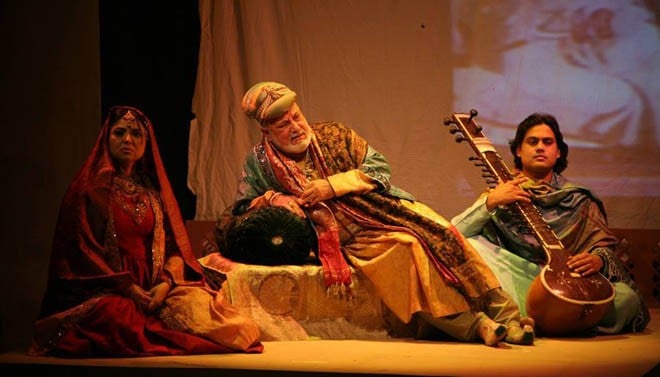

One of Ajoka Theatre’s best-known plays, Dara returned to Lahore stage recently for two power-packed performance nights at Alhamra The Mall.
Written and directed by Shahid Nadeem, the play is based on the true story of Mughal Emperor Shah Jehan’s two sons -- the older one, Dara Shikoh, who is the humbler prince and locked in a battle for the throne of India with his younger brother Aurangzeb.
However, the play is just not about the power struggle between the two Mughal princes. It’s also about the 300-year-old tussle between the two conflicting interpretations of Islam. Dara invokes the centuries old question of how the course of history would have been altered, if Dara Shikoh had become the emperor instead of Aurangzeb.
The main characters of the theatre play include Shah Jehan’s four offspring --Aurangzeb, Dara Shikoh, their two sisters, one of whom lives with the emperor Aurangzeb, and Badshah Begum who lives with her father in Agra where the latter has been sent by Aurangzeb to live out his last days. Finally, there is Hazrat Sarmad, a saint who walks the streets half naked and is a close associate of Dara.
"The play is our humble contribution to show that Islam is not about hatred or prejudice but instead is about love and harmony," said writer-director Shahid Nadeem, while giving a prelude to Dara.
The play highlights a portion of our history which is long forgotten, he said. In schools, all that the children study is about the decline of the Mughal Empire and the role of Aurangzeb in it. Yet, Aurangzeb is dubbed as a hero. Dara Shikoh seems to have been wiped out of our history books along with princess Jahan Ara and Sarmad, the mysterious mystic. The play aims to revisit this critical and dramatic turning point in our history.
Dara beautifully captures the essence of the power struggle between the two brothers on an ideological basis. Aurangzeb is shown as the fanatic Islamist who wants to impose his strict interpretation of Sharia on the subcontinent, whereas Dara is the benevolent prince who wants to dwell in the hearts of the masses by bringing about an inter-faith harmony.
The play has been acted many times before, often with fresher cast of characters. For instance, Nirvaan Nadeem, an emerging TV and film actor, played the thoughtful Sarmad Farsi for the very first time. Despite witty dialogue and poetic interjections, Nadeem could barely bring the required emotion to his portrayal of the saint that his predecessor Zia had done more effectively.
Tahira Imam who played Jahan Ara in previous productions continued to play the role of the princess and with tremendous ease. She was able to summon the right amount of warmth and kindness to the character of Jahan Ara while also displaying her disgust at the dispute over the throne.
Shah Jehan was played wonderfully by veteran actor Asim Bukhari whose best moment in the entire play would perhaps be the scene where Aurangzeb sends Dara’s severed head to him on a gold platter. The screams of anguish that emanated from the stage sent chills down the spine of the audience.
The play was a fundraiser in collaboration with Fatima Memorial Hospital’s Emergency Services and Jahanara Memorial Trust to raise awareness for the need of better emergency services in the country.
The costumes gave the characters the right royal vibe while also adding a bit of oomph to the performances. Live music by Khawar and Qawal party accentuated the aura, keeping everyone fully engrossed throughout the two-hour long play.
Perhaps, one of the very few flaws of the production could be its duration. For many Lahorites, two hours would be a long time to stay fixed in a seat, unless the play being performed before them was too engrossing. Mercifully, in Dara’s case, this was very much the case.